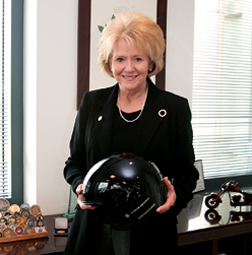... negotiations with the company after it filed for Chapter 11 bankruptcy protection. Peters says that contract negotiating experience appealed to ADOT.
Throughout her career, outsiders and colleagues have found her affable and energetic. “What’s not to like?” says Stephen E. Sandherr, the Associated General Contractors’ president and CEO. “I think deep in her core, she is an advocate for the [highway] program.” Norman Mineta, Peters’ predecessor as DOT Secretary, likes what she’s done on congestion and safety.
An industry source gives Peters high marks as DOT Secretary but adds, “There’s a lot of concern in the industry with the hard-line position she is taking in opposition to a gas-tax increase....I think people are really disappointed because they viewed her as ‘one of us.’”
House Transportation and Infrastructure Committee Chairman James L. Oberstar (D-Minn.), praises her work at FHWA and Arizona DOT, but then backs off. “Her rebirth as Secretary of Transportation has been disappointing because of her mission to cement in place this administration’s view of the future of transportation as one founded upon public-private partnerships, congestion pricing [and] tolling mechanisms,” he says.
Peter Ruane, American Road and Transportation Builders Association CEO, likes her use of the bully pulpit but says ARTBA has “fundamental disagreements” with Peters’ views. “We believe a strong federal role is essential in any future programs or policy,” he says.
Peters has her supporters. Alabama’s Riley says, “At some point we’re going to have to fundamentally rethink how we build highways in this country.”
Paul Yarossi, president of design firm HNTB, Kansas City, says Peters’ decision to dissent from the commission report is “admirable, wherever you fall in the debate.” But he says transportation programs need a combination of many different funding sources. “A gas tax needs to be part of the solution,” he says.

AP/Wideworld |

Guy Lawrence / ENR Motorcycler Peters holds helmet (Bottom) damaged in 2005 accident.
|
She objects to critics who say she parrots White House views. Tom Warne, former Arizona DOT deputy director and ex-Utah DOT head, says her federalist approach is long-held. “I know for a fact that she always felt that smaller government is better,” he says. “That goes back to her roots in Arizona.”
Peters recalls that as ADOT director, “I felt that the federal government was too intrusive....And I felt there were too many requirements put on the expenditure of federal money.” She cites a federal judge’s 1999 ruling directing the Corps of Engineers to study how its permits affect the pygmy owl’s habitat. Peters put 53 projects worth $978 million on hold around the state, the Arizona Republic reported at the time. She says it was “absurd” that the rulings affected projects so widely, because the owl doesn’t live at elevations higher than 3,000 ft.
Tougher Tone
But she acknowledges her tone has gotten tougher. “Having worked at Federal Highway and now as Secretary, I see the machinations that go on with expending this money and the level of earmarking and of special-interest programs and how far removed that is from the priorities of state and local governments,” she says.
In her spare time, Peters has returned to motorcycling, something she had done in the early years of her marriage. She manages to get on the road every other week or so when she can break away from the job. Peters broke her collarbone in a 2005 motorcycle accident in Arizona, but wearing a helmet prevented further injury, as she relates it in a public service commercial on DOT’s web page to promote motorcycle safety.
While debate over the future of the surface transportation programs simmers, Peters faces some immediate problems on the infrastructure front. To shore up the Highway Trust Fund, the administration’s fiscal 2009 budget proposal, released Feb. 4, recommends shifting money from the fund’s healthier transit account to its highway account. The Senate Finance Committee last year approved a plan to add $5 billion to the trust fund, most of it via a general Treasury reimbursement for the fund’s disaster relief expenditures.
In addition, a multi-year aviation reauthorization bill is mired in the Senate, and a current stopgap bill runs out March 1. FAA has been unable to approve new airport construction grants because Congress failed to approve the needed contract authority. Without some remedy, “We may miss a whole construction season,” Peters says.
What’s next? Peters would like to finish the term as DOT secretary, and then return to Arizona. A source says Peters wants to be the state’s governor, but she is noncommittal. “I can consider where I go in the future once I get back home next year,” she says.

Post a comment to this article
Report Abusive Comment